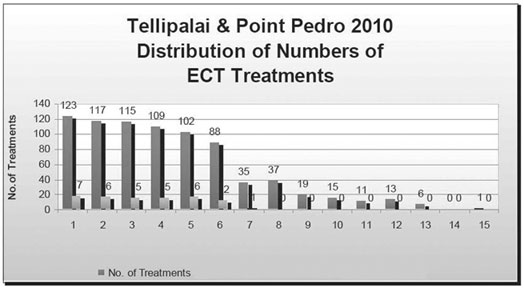|

Overcoming the pain from mental trauma
By Nilma DOLE
Many of us have not probably been affected directly by the trauma of
war, the difficulty of losing a loved one through violence or even
losing their belongings to the 2004 tsunami.
If we have, it can be difficult to overcome the pain, but how does it
feel for others, who have to bear the brunt of pain right throughout
their lives?
Take how it would feel for those in the Northern Province who have
endured many a suffering and still continue to suffer in silence because
of lack of resources or the services to help them cure their pain.
Promotion
Mental health promotion in Jaffna is still at an all-time low with
lack of experts for helping these mental health victims. Instead there
is limited counselling, some temporary relief and then patients are
asked to carry on with their lives.
Today, mental health problems in Jaffna District is ever present and
very common especially among the youth. Unemployment with lack of access
to basic needs and the whole trauma of the war has made it tougher to
overcome the pain. Hence, there seems to be more fodder for trauma to
turn into anger which would be a melting pot of deadly consequences.
At present, mental health services have adopted a tiered model of
care, ensuring that the most specialised services are focused on the
most severely affected. However, a majority of common mental health
problems are meant to be dealt with by the community but this isn't
always successful considering there are limited resources and not many
experts to help such victims.
Link
According to the Regional Director of Health Service (RDHS), Mental
Health Services division in Jaffna, forming a vital link between these
two tiers is the multi-disciplinary team of staff who perform a wide
range of interventions in support of the specialised services.
Under the RDHS, core mental health services offer acute impatient
care at two established units and clinic services from five locations
across the Northern Province. Even though rehabilitation services are
available both on an impatient basis and in the form a day services,
there still needs to be more professionals working to ensure timely
delivery of mental health services.
In 1987, The Association for Health and Counselling (AHC) better
known as "Shanthiham" was set up in Jaffna. This was established in the
aftermath of an increase in torture victims the concept of "befriending"
and later "counselling" was introduced and services made available for
the first time. Since its inception, proper awareness within the medical
profession, humanitarian service providers and the society at large
there has been a constant demand for trained counsellors.
Counsellors
AHC since its inception has trained seven batches of counsellors
supported by various international charity organisations. Since 2001, 42
such core groups have been trained but as of today, only 22 are still
active.
"There is still a shortage of counsellors in the region. Many
experienced counsellors have left the Peninsula as a result of the
continuing armed conflict.
Especially the well-educated people tend to leave the area.
In the coming years, many 'bare-foot' counsellors must be trained who
are familiar with the communities of the less well educated.
The amount of people with mental health problems in Jaffna is
growing, for example due to the continuously growing amount of landmine
victims," said Dr. Guus van der Veer, Transcultural Psychotherapist,
Mental Health Consultant, Transcultural Psychosocial Organisation,
Amsterdam.Each core group is expected to serve 450 to 500 families in
their village.
Core groups
According to the publication titled 'Mental Health in Sri Lanka'
(Dr.Shehan Williams and Dr.Jayan Mendis), the active core groups
undertake a wide variety of interventions at individual, family and
group level.
 Individual interventions include supportive listening, motivating
children who have dropped out of school to return to education,
assistance with form filling, or helping elderly people get access to
basic health care. Individual interventions include supportive listening, motivating
children who have dropped out of school to return to education,
assistance with form filling, or helping elderly people get access to
basic health care.
At family level, they intervene after family breakdowns due to
addictions and abuse. Group work includes advice on teenage pregnancy
and early marriage, and societal clubs for children, women and the
elderly.
Treatment
According to Prof. Daya Somasundaram, Consultant Psychiatrist and
Head of the Department of Psychiatry, Faculty of Medicine, University of
Jaffna. Member Presidential Task Force on Mental Health, "There are
considerable psychosocial problems in those attending the OPDs. Somatic
and psychosocial treatment in the form of counselling, relaxation
exercises and referral for economic or rehabilitation assistance will be
of immense benefit for the patients; in the long term, reduce the
workload of the staff and need of drugs."
Dr. David Ratnavele, Psychiatrist, Member Presidential Task Force on
Mental Health said, "We need to anticipate that sooner or later some
semblance of peace will be seen and it is then that problems which are
now hidden will emerge with great intensity."
Indeed, if mental health problems are not tackled at a grassroots
level, there is room for more problems to breed.
A good policy exists but the need for resources and expertise is
required for helping the people of the Northern Province.
There seems to be ignorance on part of those who have the capacity to
invest in resources for mental health in the Northern Province.
Hopefully, the mental health needs of these people will be addressed
before it's too late.
References from ww.shanthiham.org and www.jaffnahealth.org
Food-borne illness may one day be prevented by a pill
Modified probiotics, the beneficial bacteria touted for their role in
digestive health, could one day decrease the risk of Listeria infection
in people with susceptible immune systems, according to Purdue
University research.
 Arun Bhunia, a professor of food science; Mary Anne Amalaradjou, a
Purdue postdoctoral researcher; and Ok Kyung Koo, a former Purdue
doctoral student, found that the same Listeria protein that allows the
bacteria to pass through intestinal cells and into bloodstreams can help
block those same paths when added to a probiotic. Arun Bhunia, a professor of food science; Mary Anne Amalaradjou, a
Purdue postdoctoral researcher; and Ok Kyung Koo, a former Purdue
doctoral student, found that the same Listeria protein that allows the
bacteria to pass through intestinal cells and into bloodstreams can help
block those same paths when added to a probiotic.
"Based on the research, it looks very promising that we would get a
significant reduction in Listeria infections," said Bhunia, Bhunia's
earlier work showed that Listeria triggers intestinal cells to express
heat shock protein 60 on their surfaces. That allows Listeria to bind to
the intestinal cells using an adhesion protein and pass into them,
acting as a sort of gateway to the bloodstream.
Once in the bloodstream, even small doses of Listeria can cause
fever, muscle aches, nausea and diarrhea, as well as headaches, stiff
neck, confusion, loss of balance and convulsions if it spreads to the
nervous system. It can also cause abortion and stillbirth in pregnant
women.According to authorities it sickens about 1,500 and kills 255
people each year in the United States and primarily affects pregnant
women, newborns, older adults and those with weakened immune systems.
"We're seeing fewer Listeria infections, but the severity of those
infections is still high," Amalaradjou said.
The researchers found that probiotics alone were ineffective in
combatting Listeria, so they stole a trick from the bacteria's own
playbook. By adding the Listeria adhesion protein to the probiotic
Lactobacillus paracasei, they were able to decrease the number of
Listeria cells that passed through intestinal cells by 46 percent, a
significant decrease in the amount of the bacteria that could infect a
susceptible person.
With the adhesion protein, Lactobacillus paracasei interacts with
heat shock protein on the surface of intestinal cells just as Listeria
would. The probiotic then attached to the intestinal cells, crowding out
Listeria."It's creating a competition," Bhunia said.
"If Listeria comes in, it doesn't find a place to attach or
invade."Bhunia said he could one day foresee the development of a pill
or probiotic drink that could be given to at-risk patients to minimize
the risk of Listeria infection.
The results came from tests on human intestinal cells. The next step
would be animal testing. Bhunia said that would allow him to see whether
different doses would have a greater effect.
- MNT
|

